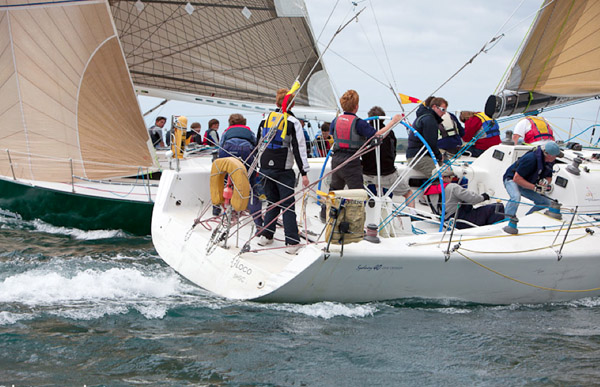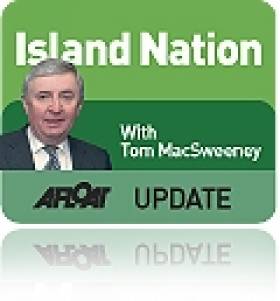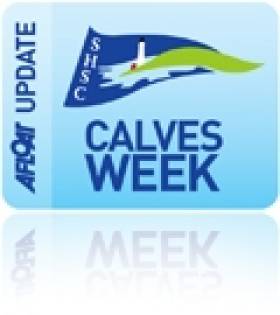Displaying items by tag: Simon Coveney
Marine is Back
It is a reminder which I hope that the media in general will note and that his tile of Marine will be used as often as agriculture is. The general media has been notorious, in my view, for disregarding the marine sector unless there is disaster, emergency or controversy involved.
The return of the title 'Marine' to a Government Department is, to put it bluntly, a kick-in-the-ass which civil servants needed. It was a betrayal of this island nation's heritage when those in charge of the former Department of Transport held a meeting which decided to remove the title marine from the Department's name, even though the then Minister had been assigned the role of Minister for Transport and Marine. The man in charge of that Department, Noel Dempsey, did not demonstrate a lot of interest in the marine, being more noted for trying to shut down the coastal radio stations at Valentia and Malin, where he was beaten off by public opposition, which also happened when he tried to remove 24-hour rescue helicopter service in the south-east and for his introduction of laws which criminalised fishermen.
Hopefully, the restoration of 'Marine' to a Department's name will be the harbinger of better things for the marine sphere.
I have heard some disappointment expressed that the marine is not a department on its own, but what the Fine Gael and subsequently Coalition Programme for Government agreed by Enda Kenny and Eamon Gilmore said was: "Marine responsibilities will be merged under one Department, for better co-ordination in policy delivery."
They have been, though some of the finer detail remains to be seen, such as will the ports be moved away from Transport, to where port companies and commercial interests originally campaigned to have them moved? And how will the split of marine tourism work between Agriculture and Marine and the separate tourism department? A similar issue may arise in regard to sailing and sport, but it seems to me a positive step that the disregard which Fianna Fáil and the Greens showed for the marine sector is being changed.
It was also right to end a separate department for defence. With a small army and navy, smaller than the marine sector, it was nonsense that it should have been a department of its own.
Let us therefore, hope for the future and take a positive view of the change as being for the better.
'Gloves Off' Wins Calves Week Regatta Cup
the start line moved outside the harbour the fleets took in both the Goat and Calve Islands together with the marks off Castle Island.
In Class Zero IRC Kieran Twomeys "Gloves Off" finished a brilliant week of sailing to take the Regatta Cup and also the overall trophies in both handicap divisions, while Schull Sailing Club Commodore Morgan O' Donovan's "Loco" won the Regatta Echo cup.
In Class One IRC the overall result went right down to the wire with victory in the final race giving Donal O Leary's "D Tox" the title after a six points tie break with Simon Coveney s "Wavetrain". D Tox finished a very successful weeks racing by also winning the Echo overall trophy.

Infinity and Beyond (left) and Loco on opposite tacks. Photo: Bob Bateman. More photos on the gallery here
Competition was also intense in Class Two IRC with Conor Ronan's "Ruthless" just edging out the Deasey/Ivers/Desmond crew in "Bad Company" for the overall trophy thanks to his better last race result, while in Echo a third place in the regatta race, behind Andrew Mackeys "Lornadrew" was good enough to win the overall for John McGowan's "Mackey G".
The overall in Class Three IRC was never in doubt with David Kenefick in "Tiger" scoring five bullet , while a third in the final race for Paul Murrays "Full Pelt" saw him claim the Echo overall.
In Class Four the Hanley Brothers in "Saoirse" finished off a productive weeks racing by winning the IRC regatta cup and the overalls in both handicap divisions with Una Buckley sailing "Tete-a-Tete to victory in Echo.
In the White Sail One fleet the Don McCarthy sailed VSOP won the regatta race, while a third place for Bryan Heffernans "Aisling" was good enough for
him to clinch the overall trophy. In White Sail Two Tadgh Dwyer's "Brazen Huzie" won the overall, having discarded the regatta result which saw Frank
Murphys "Dreamcatcher take the trophy.
The McMahon trophy for best local boat went to Paul Murray's "Full Pelt" while the Pearson "Spirit of the regatta trophy "was presented to Bill Rigney.






























































